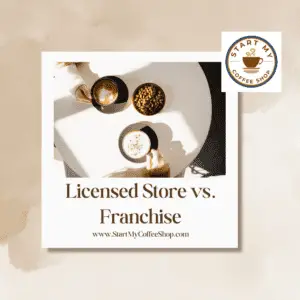Whether the sweet-sounding Venti Pumpkin Spice Latte speaks to you, or whether you’re looking for that new refreshing summer tea, it doesn’t matter—Starbucks has a corner on the coffee shop market, and they’re constantly making profits. But how can you open your own Starbucks store to get a piece of that action, along with serving your favorite caffeinated drinks?
Starbucks does not franchise; however, they permit licensed stores or an official store that opens in an already established business, such as a hospital or supermarket. Opening a licensed Starbucks shop costs around $315,000. You will also be required to have around $700,000 in liquid assets.
But how does this process work? What is the difference between owning a licensed store and owning a franchise? How can you apply to have a licensed store in your business? Read on to find out more.
About Starbucks
Being the most popular coffee shop chain in the United States, Starbucks was created in 1971 and sells products under the name Starbucks, Starbucks Reserve, Teavana, Seattle’s Best Coffee, Ethos, Evolution Fresh, and Princi.
Starbucks’ total net revenue was more than $20 billion in 2020, as reported in their annual report. The company also remains at the top of the list on market shares. In October 2019, they held 40 percent of the coffee shop market share.
Licensed Store vs. Franchise

The most important thing to note before even considering opening your own Starbucks store is that you will not be owning a Starbucks franchise—it will be considered a licensed store.
Their stores are company-owned, meaning their revenue stays within the company and not outside investors, or they are licensed stores, where they allowed outside operators to use the brand trademark, sell the products, and are not obligated to follow the company’s set business plan or their rules. Because of that tradeoff, licensed stores pay a royalty fee to the company.
A franchise, on the other hand, is when a business establishes the brand’s trademark and business system and allows another person, or franchisee, to pay a royalty and initial fee for the right to do business under their name and system.
What’s the difference? Franchisees own their business, while licensees do not. You are essentially renting the store from Starbucks. A franchise uses the entire brand and its operational plan, while a licensed store has its own business plan while using the brand trademark and products. You get significantly less support from the parent company as a licensed store when you enter into a licensing agreement, in most cases—but not with Starbucks. They maintain complete control over the design, menu, equipment, training, promotions, and food, and have very little control when it comes to operations. For all intents and purposes, Starbucks is simply opening their own business within yours and you get a cut of the profits for including it in your already existing business.
In an article by Entrepreneur in 2003, Starbucks CEO Howard Schultz explained that people know and understand the Starbucks brand, so building their own brand with their officially owned stores is important to reflect back onto the company. They can maintain control over their image and products without using franchised businesses. The quality of their product could wane if they allow for franchises, he explained.
Licensed Store: What does this mean?
If you’re still interested in opening your own Starbucks, you will have to have your own business already, such as a shopping center, hospital, supermarket, etc. Because you can’t franchise, you will have to contact the company to place a Starbucks store in your already existing business. As of October 2017, about 41 percent of Starbucks locations were licensed stores, so don’t be discouraged if you think this is an impossible feat.
With this licensing agreement, you are trying to convince Starbucks that your existing location, whether it’s a supermarket or a hospital, can help them bring in a certain demographic—along with profits.
While your standard licensing agreement (when compared to a franchise) doesn’t require you to use the same business model, Starbucks has its own setup—they help their owners with every step of the process, including the menu, setting up training, and providing support, both online and on-site. This means all stores technically belong to the Starbucks Corporation.
How much does it cost to start a licensed Starbucks store?
Because you already need an established business, the price is quite high. The average cost of the total investment needed to start a Starbucks licensed store is around $315,000. That figure does not include the costs associated with owning an existing business or location, so that number is significantly higher when you include your own business.
While the cost is around $315,000 for this licensed store, you are required to have around $700,000 in liquid assets. This doesn’t mean you will have to use that money to purchase your store, nor does it increase the cost to over a million; having liquid assets simply means that you need to have something that can be converted into cash at its market value in a short amount of time. You can expect about a seven percent royalty payment from Starbucks for your licensed store.
According to Starbucks itself, the coffee company ended its 2020 with a net revenue of $6.2 billion. Considering there are currently 32,646 stores worldwide, each store could rake in an average of about $190,000 per year total profits.
How does this compare to other franchises?
Although Starbucks doesn’t franchise, other coffee shops do. Dunkin’ Donuts requires franchisees to pay a fee of $40,000, with their liquid capital requirement at $125,000 and the total investment ranging from $217,300 to over $1.5 million. The website states that the minimum net worth of your Dunkin’ franchise is $250,000.
Tim Hortons, on the other hand, costs $35,000 for a franchising fee, $60,000 in liquid capital is required, and the total investment doesn’t exceed $670,000, while Caribou Coffee requires $3 million in cash or liquid assets and a minimum commitment of ten or more locations, with a range of $250,000 to $1.1 million in investment.
What’s the difference? Profit margins. Even being one of the most popular coffee shop chains after Starbucks, Dunkin’ Donuts only saw a revenue of $287.4 million last year, while Tim Hortons made $486 million last year. Caribou Coffee saw a revenue of $306 million in 2019.
These companies also provide a significantly less royalty percentage—with Starbucks, you’re getting seven percent, while Dunkin Donuts only gives 5.9 percent; Tim Hortons, 4.5 to 6 percent; and Caribou Coffee, 5 to 6 percent.
What are the benefits of becoming a licensed store?

According to the Starbucks licensing website, getting a licensed store can not only give your area a community gathering place, but allows you to take advantage of their product and operations set up. Included when you open a licensed store are store design, the Starbucks menu, equipment, training, and support, along with their proprietary equipment and fixtures. They also give you their seasonal promotions, their food and bakery program, and their whole bean packaged coffee and other merchandise. The licensed store can also benefit from ongoing support through consulting and on-site visits.
These aren’t the only benefits. Because you don’t independently own the store, you can lean on what has already been proven to be a successful business model. Starbucks has demonstrated time and again that they know their coffee, and you can lean on that experience when you open one of their licensed stores in your business.
How do I apply to open a licensed store?
A formal application is required to make a request to bring a licensed store to a location. You will have to expand upon your business information, explaining your location, your assets, and any liabilities that may exist. You will be contacted then for further details.
Unfortunately, Starbucks does not allow the general public to know what the qualifying requirements are to become a licensed store. If you are interested in bringing one to your business, you can apply to bring a licensed store to your business at their website.
When it comes down to it, it all depends on how you want your coffee shop business to run. Other franchises are cheaper in the long run and you have more ownership and input into the business model, but you get significantly less royalties and profits. Starbucks essentially rents the space from you in your existing business, but you get to reap the benefits of their business model and high profits.
Frequently Asked Questions
Usually, a licensing agreement is easier and cheaper than a franchise. Because you have less input from the overall management of the parent company, a licensing agreement is typically easier. That being said, you give up control over the quality of services or products in a licensing agreement.
Yes, there are other countries that allow Starbucks franchises. When expanding out of North America, the company started allowing franchises to be purchased in China or Europe. These franchises can be double the cost of a licensed store, and you must be an owner or manager of an already successful business before you are even considered.
Even though they aren’t technically franchises, a Starbucks licensee can make around $120,000 per year for including a Starbucks coffee shop in their already existing location.
To learn more on how to start your own coffee shop checkout my startup documents here
Please note: This blog post is for educational purposes only and does not constitute legal advice. Please consult a legal expert to address your specific needs.

Hi! I’m Shawn Chun
My adventure in coffee began when I first launched my first coffee shop back in the early 2000s. I had to figure out so many things on my own and to make it worse within 2 years of opening two large corporate coffee chains moved in just blocks away from me!
As I saw smaller and even some larger coffee shops in the neighborhood slowly lose customers to these giant coffee chains and slowly close up shop, I knew that I had to start getting creative…or go out of business.
I (like you may be) knew the coffee industry well. I could make the best latte art around and the foam on my caps was the fluffiest you have ever seen. I even had the best state-of-the-art 2 group digital Nuova Simonelli machine money could buy. But I knew that these things alone would not be enough to lure customers away from the name brand established coffee shops.
Eventually, through lots of trial and error as well as perseverance and creativity I did find a way to not only survive but also thrive in the coffee/espresso industry even while those corporate coffee chains stayed put. During those years I learned to adapt and always faced new challenges. It was not always easy, however, in the end, I was the sole survivor independent coffee shop within a 10-mile radius of my location. Just two corporate coffee chains and I were left after that year. All told the corporate coffee chains took down over 15 small independent coffee shops and kiosks and I was the last one standing and thriving.
Along the years I meet others with the same passion for coffee and I quickly learned that it is not only “how good a barista is” that makes a coffee shop successful, but the business side of coffee as well.
Hence why I started this website you are on now. To provide the tools and resources for up and coming coffee shop owners to gain that vital insight and knowledge on how to start a coffee shop successfully.
Stick around, browse through my helpful blog and resources and enjoy your stay! With lots of LATTE LOVE!
Shawn






